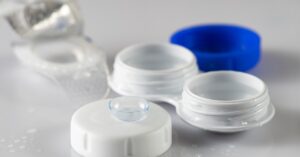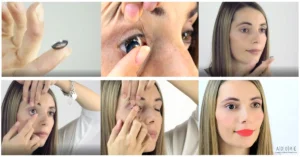For contact lens wearers, the question of whether Is It Ok to Swim With Contact Lenses is a common one. While some people may swim with their lenses without any issues, it’s important to understand the risks involved and consider certain factors before making a decision.
Understanding the Risks
Swimming with contact lenses can pose certain risks to your eye health. Water, whether it’s from a pool, lake, or ocean, can introduce various microorganisms, chemicals, and debris that may come into contact with your lenses. These factors can increase the likelihood of eye infections and other complications.
Additionally, contact lenses are designed to adhere to the surface of your eyes. When exposed to water, they can absorb and hold onto the water, potentially causing discomfort, blurry vision, and irritation. This can be particularly problematic if the water is contaminated or contains chemicals like chlorine.
Factors to Consider
Before deciding whether to swim with contact lenses, there are several factors you should consider:
- Type of Water: The quality of the water you will be swimming in can greatly impact the risks involved. Public pools, hot tubs, and natural bodies of water may have different levels of cleanliness and potential contaminants.
- Length of Time: The longer you spend swimming with contact lenses, the greater the risk of complications. Extended exposure to water increases the chances of waterborne microorganisms adhering to your lenses and potentially causing infections.
- Lens Type: The type of contact lenses you wear can also impact the risks. Daily disposable lenses are generally considered more suitable for swimming since they are discarded after each use, reducing the potential for contamination. However, it’s still important to exercise caution.
- Eye Sensitivity: Some individuals may have more sensitive eyes that are prone to irritation and infections. If you have a history of eye problems or sensitivity, it may be best to avoid swimming with contact lenses altogether.
- Precautions: Taking certain precautions can help minimize the risks associated with swimming while wearing lenses. For example, wearing waterproof prescription goggles can provide clear vision without the need for contact lenses. It’s also crucial to follow proper lens care and hygiene practices before and after swimming.
Ultimately, the decision to swim with contact lenses is a personal one. However, it’s important to weigh the potential risks against the convenience of wearing lenses in the water. Consulting with your eye care professional can provide valuable insights and guidance based on your specific circumstances.
For more information on contact lens care and maintenance, refer to our articles on how to clean contact lenses and how to remove contact lenses. Regular eye exams are also essential to ensure the ongoing health of your eyes.
Potential Risks of Swimming with Contact Lenses
While it may be tempting to swim with your contact lenses, it’s important to understand the potential risks involved. Swimming pools, hot tubs, lakes, and oceans all have various microorganisms that can come into contact with your eyes. Here are some key risks associated with swimming while wearing contact lenses:
1. Increased Risk of Eye Infections
Swimming with contact lenses significantly increases the risk of eye infections. Water, especially in recreational areas, can contain harmful bacteria, viruses, and other microorganisms that can adhere to your contact lenses. These microorganisms can cause serious eye infections such as keratitis, which is the inflammation of the cornea. The warm and moist environment created by contact lenses provides an ideal breeding ground for these microorganisms, increasing the chances of infection. It’s important to note that even chlorine-treated pools are not completely free from harmful microorganisms.
2. Irritation and Discomfort
Swimming with contact lenses can lead to irritation and discomfort. The chemicals in the water, such as chlorine, can cause dryness, redness, and irritation in your eyes. This can make wearing contact lenses uncomfortable and may even lead to temporary blurred vision. Additionally, the combination of contact lenses and water can cause your eyes to become more sensitive, leading to increased eye irritation.
3. Issues with Contact Lens Displacement
Swimming can cause your contact lenses to dislodge or move around on your eyes. The water and pressure from swimming can wash away the natural tear film that helps to keep your contact lenses in place. This can result in your lenses shifting, moving, or even falling out of your eyes. If this happens, it may be difficult to locate and reinsert the lens, especially in open water. It’s important to remember that losing a contact lens in the water can be costly and inconvenient.
To minimize the risks associated with swimming while wearing contact lenses, it is advisable to consider alternative options such as prescription swimming goggles or prescription dive masks. These options provide clear vision underwater without the need for contact lenses. For more information on alternatives to wearing contact lenses in the water, refer to our article on prescription swimming goggles and prescription dive masks.
In conclusion, swimming with contact lenses poses several potential risks, including increased risk of eye infections, irritation and discomfort, and issues with contact lens displacement. It’s important to prioritize the health and safety of your eyes by taking precautions, such as using waterproof prescription goggles or daily disposable contact lenses. Additionally, practicing proper lens care and hygiene is essential to maintain good eye health. If you have any concerns or questions, consult with your eye care professional, who can provide personalized advice based on your specific needs.
Precautions and Safety Measures of Question, Is It Ok to Swim With Contact Lenses?
When it comes to swimming with contact lenses, it’s important to prioritize your eye health and take necessary precautions. Here are some precautions and safety measures you can consider to minimize the potential risks and enjoy your swim with peace of mind.
1. Waterproof Prescription Goggles
If you’re a regular swimmer and prefer to wear your contact lenses while swimming, investing in waterproof prescription goggles can be a wise choice. These goggles are specially designed to provide a tight seal around your eyes, keeping water out and preventing your lenses from coming into contact with pool water or seawater. By wearing waterproof prescription goggles, you can enjoy clear vision without the worry of your contact lenses being compromised.
2. Daily Disposable Contact Lenses
Another option to consider is using daily disposable contact lenses specifically for swimming. These lenses are designed for single-use and are discarded after each wear, reducing the risk of contamination and eye infections. Daily disposable lenses eliminate the need for cleaning and storage, making them convenient for occasional swimmers or those concerned about water-related risks. However, it’s important to consult with your eye care professional before using any new type of contact lenses.
3. Proper Lens Care and Hygiene
Maintaining good lens care and hygiene practices is crucial for contact lens wearers, especially when swimming with contact lenses. Before and after swimming, it’s important to follow proper lens care routines, such as cleaning, disinfecting, and storing your lenses as recommended by your eye care professional. Additionally, remember to wash your hands thoroughly with soap and water before handling your lenses to prevent any potential contamination.
Here are some general tips for lens care and hygiene:
- Use a multipurpose contact lens solution recommended by your eye care professional to clean and disinfect your lenses.
- Avoid using tap water or saliva to rinse or store your lenses, as they may contain harmful microorganisms.
- Replace your lens case regularly to prevent bacterial growth.
- Avoid sleeping or swimming with your lenses unless specifically approved by your eye care professional.
- Follow the recommended replacement schedule for your contact lenses to ensure optimal eye health and vision.
By following these precautions and safety measures, you can minimize the potential risks associated with swimming while wearing contact lenses. However, it’s always recommended to consult with your eye care professional for personalized advice based on your specific eye health needs. Regular eye exams (Michigan) are also important to monitor the overall health of your eyes and ensure that your contact lenses are still suitable for your vision correction needs.
Alternatives to Wearing Contact Lenses in the Water
For contact lens wearers who want to enjoy swimming without the risks associated with wearing contact lenses, there are several alternatives available. These alternatives provide clear vision while keeping your eyes protected in the water. Here are a few options to consider:
Prescription Swimming Goggles
Prescription swimming goggles are a popular choice for those who require vision correction. These goggles are designed with built-in prescription lenses, allowing you to see clearly underwater without the need for contact lenses. Prescription swimming goggles come in various styles and diopter strengths, ensuring a customized fit for your specific vision needs.
| Diopter Strength | Prescription |
|---|---|
| -1.00 to -8.00 | Myopia (Nearsightedness) |
| +1.00 to +8.00 | Hyperopia (Farsightedness) |
| Astigmatism | Toric Lenses (Cylindrical Prescription) |
Prescription Dive Masks
If you enjoy diving or snorkeling, a prescription dive mask might be the perfect solution. These masks are specially made with prescription lenses to provide clear vision underwater. Prescription dive masks offer a wider field of vision compared to swimming goggles, making them suitable for those who require stronger vision correction.
| Diopter Strength | Prescription |
|---|---|
| -1.00 to -8.00 | Myopia (Nearsightedness) |
| +1.00 to +8.00 | Hyperopia (Farsightedness) |
| Astigmatism | Toric Lenses (Cylindrical Prescription) |
Other Non-Contact Lens Options
If swimming goggles or dive masks don’t suit your needs, there are other non-contact lens options available for enjoying water activities while maintaining clear vision. Some individuals opt for prescription snorkel masks, which combine a prescription lens with a built-in snorkel tube. These masks allow you to explore the underwater world while keeping your vision sharp and your eyes protected.
Alternatively, you can consider prescription swim caps. These caps are made with a prescription lens embedded in the front, providing clear vision without the need for additional eyewear. Prescription swim caps are a convenient option for those who prefer to keep their hair dry while swimming.
When exploring these alternatives, it’s essential to consult with your eye care professional to determine the most suitable option for your specific vision requirements. They can help you choose the right prescription strength and guide you in making an informed decision.
Remember, proper eye care and regular eye exams are crucial for maintaining healthy vision, whether you’re wearing contact lenses or using alternatives for water activities. For more information on contact lens care and maintenance, check out our article on Contact Lens Exams.
By choosing the right alternative for swimming and water activities, you can enjoy clear vision and have peace of mind knowing that your eyes are protected.
Tips for Contact Lens Wearers
If you are a contact lens wearer and have concerns about swimming with your contact lenses, there are several important tips to keep in mind to ensure the health and safety of your eyes.
Consult with Your Eye Care Professional
Before making a decision about swimming with contact lenses, it is crucial to consult with your eye care professional. They can provide personalized advice based on your specific eye health and contact lens type. They may recommend alternatives to wearing contact lenses in the water or provide guidelines for safe use.
Proper Lens Care and Maintenance
Regardless of whether you choose to swim with contact lenses or not, proper lens care and maintenance are essential. Follow these guidelines to keep your lenses clean and your eyes healthy:
- Wash your hands: Before handling your contact lenses, make sure to wash your hands thoroughly with soap and water. This helps to minimize the risk of transferring any harmful bacteria or debris onto your lenses.
- Use appropriate solutions: Clean and disinfect your contact lenses using recommended contact lens solutions. Avoid using water or saliva to clean your lenses, as this can introduce harmful microorganisms to your eyes.
- Follow the recommended wearing schedule: Adhere to the wearing schedule recommended by your eye care professional. Avoid wearing your contact lenses for longer durations than advised, as this can increase the risk of eye infections and discomfort.
- Replace your lenses as recommended: Replace your contact lenses according to the recommended schedule. Using expired lenses can increase the risk of eye infections and can lead to discomfort and reduced vision.
For more detailed information on how to properly care for your contact lenses, visit our article on how to clean contact lenses.
Importance of Regular Eye Exams
Regular eye exams are essential for contact lens wearers, especially if you are considering swimming with your lenses. Eye exams allow your eye care professional to monitor your eye health, assess the fit of your lenses, and address any concerns or issues you may have. They can also provide guidance on the best practices for contact lens use and help you make informed decisions about swimming with your lenses.
By following these tips and taking proper precautions, you can maintain the health of your eyes while wearing contact lenses. Remember, the safety and well-being of your eyes should always be a priority.
Frequently Asked Questions (FAQs)
1. Is it safe to swim with contact lenses?
While some people swim with contact lenses without issues, it poses certain risks. Water can introduce microorganisms and chemicals, increasing the risk of eye infections and discomfort.
2. What are the potential risks of swimming with contact lenses?
Risks include increased risk of eye infections, irritation, discomfort, and issues with contact lens displacement. Waterborne microorganisms can adhere to lenses, leading to infections.
3. Can I wear daily disposable lenses for swimming?
Daily disposable lenses are more suitable for swimming, but caution is still advised. They reduce contamination risk, but proper lens care and hygiene are crucial.
4. Are there alternatives to wearing contact lenses in the water?
Yes, alternatives include prescription swimming goggles and dive masks. These provide clear vision without the need for contact lenses, minimizing risks associated with swimming.
5. How can I minimize the risks of swimming with contact lenses?
Precautions include using waterproof prescription goggles, considering daily disposables, and following proper lens care. Consult with an eye care professional for personalized advice.
Conclusion:
Swimming with contact lenses involves potential risks such as infections, irritation, and discomfort. While some may choose to swim with their lenses, alternatives like prescription goggles or dive masks offer clear vision without these risks. Prioritizing proper lens care, hygiene, and regular eye exams are essential for maintaining eye health, whether you swim with contact lenses or opt for alternatives. Always consult with your eye care professional for personalized advice based on your specific circumstances.

























